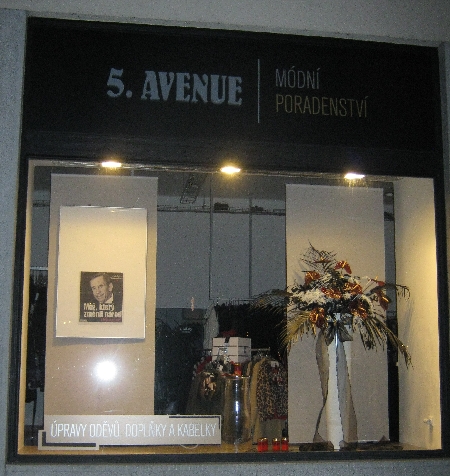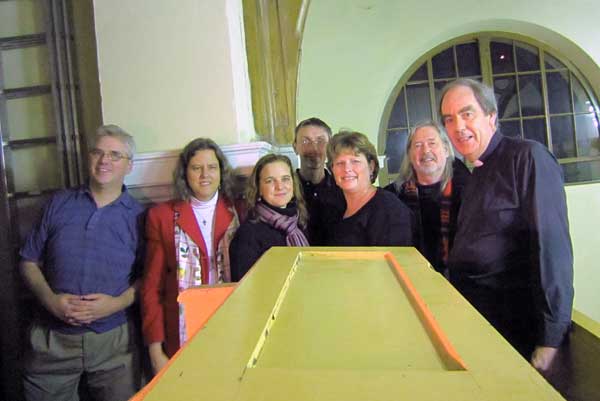| The picture above is of the front page of today’s edition of Dnes /’Today’, one of the leading Czech national newspapers. The first section of the paper, all sixteen pages of it, is completely given over to reports about a whole variety of aspects of the life and death of Václav Havel to the total exclusion of any other news. In the second section for regional news, the first three pages are given over to describing the reaction in Prague to Havel’s death. All of that I believe, speaks volumes – newspaper editors usually know what their readers want to read.
What will be totally new territory for this nation is the organisation of a state funeral at which the attendance of numerous major figures from around the world is expected. No Czech national of the stature of Václav Havel has died since the fall of communism just over twenty-two years ago. Preparations for this event, which it is currently suggested, will happen this coming Friday, will be interesting to observe. As for the first ever English-language Anglican Carol Service in Brno, a blog post will follow shortly. |
9 thoughts on “Václav Havel – death of a statesman”
Comments are closed.





I agree – definitely the first time I’ve seen the CR featured on the BBC website!
I went to Wenceslas Square yesterday early evening – it was a sombre place, but very dignified and moving. A few thousand people were there, leaving candles, signs, photographs and (a few) cigarettes (photo of the scene available on my own post on the topic). People were rattling their keys, which a friend told me was a form of symblic demonstration during the Velvet Revolution.
I get the impression that Havel will be most mourned by older generations, than by younger people, who remember him only as president.
Hi Czechingin – thanks for once more visiting my blog & leaving a comment.
Because of going to Brno, I haven’t had a chance to get to Wenceslas Square & see the tributes. But I have read about them & seen pictures, both on your blog, Facebook & elsewhere. I think your comment that it will be the older generations, that is those who lived under communism, who will mourn Havel’s passing the most, is correct. They respect him for the stand that he took, for his drafting & support of Charter 77 etc. I have heard frequent complaints from that generation, that younger Czechs do not appreciate the freedoms they enjoy & what the older generation suffered during the communist era.
I followed the coverage on the BBC (TV and website) with great interest, Ricky, as I remember very well the achievement of the Velvet Revolution and Vaclav Havel’s stature as President. As you say, his death has been overshadowed by events in North Korea, but He will be remembered for a very long time.
Hi Perpetua – yes, I wasn’t complaining about the coverage given by the BBC to the death of Kim Jong-il as clearly, it has implications about the future direction of North Korea & its nuclear capability. Rather, I have been fascinated by the reaction here in the Czech Republic to the death of Václav Havel.
The impression I had previously had was that Havel was more admired outside of his home country than within it. The reaction here since his death, has rather disproved that theory. Czechingin is correct in saying that it is the older generation, those who experienced what it was like to live under communism, who most mourn his passing. But there is a very wide outpouring of grief & expression of appreciation of all he achieved. As you say, Václav Havel will be remembered for a long time, both here in the Czech Republic & in the wider world.
Hi Ricky,
Havel changed greatly in the office of President. His first office photo in a sweater laying across the desk with the staff around the desk was replaced by the ‘usual’ Presidential formality. His regular run-ins with V. Klaus who called him a Socialist also made for bad blood between the right-wing of Czech politics which deridingly called his movement ‘truth-lovers’ – people were defined as Klausovec or Havlovec in those days. Politicians always have dirty hands and so Havel’s reputation was tarnished in the latter part of his presidency. That is what you were hearing about his being more respected outside the CR.
With his death which followed that of Dienstbier in the summer and Magor last month, we are seeing the end of an era as the dissidents die off. If you look at the census data where the Roman Catholic Church has lost 2/3 of its flock in the last ten years and only 5 of ten people declare faith (it was 9 of 10 last time round), you can see a certain cynicism coming in or a loss of ideals. Havel’s death has touched that sore point – our collective loss of our ideals and hope for a better future and so his death is much more about his candle in the darkness of Communism in the 70s and 80s than about his messy presidential issues of the late 90s or his second wife. His first wife Olga was widely respected and his second wife never lived up to her example. When Havel married the second wife, TV Nova broadcast a B-film she was in where she played a prostitute.
Havel himself was aware of his clay feet. He admitted to being a coward and an ‘alleged’ hero. He was nowhere to be seen in Week 1 of the Revolution. Once it was off the ground, he hopped on and became the main speaker because of his reputation. Later, he was even made president and once there he cleaned it out – the StB were kicked out and it was opened to the people again. And so he was a president of the people.
Since leaving office, he has been a speaker for human rights, but some of those writings have been apologetics for NATO raids more than a true stance for peace – ‘the bombs are not to destroy but to save lives’ about Kosovo for instance.
He will be sorely missed by the nation – he was able to have a civil discourse unlike most politicians these days and able to be heard in the world. There is nobody standing in the wings to take his place. And we are sick of the nastiness of the public discourse today. In a time of apathy and cynicism, we will miss his voice of hope. We are crying for ourselves. He has left us too soon. There is too much left to be done.
All the best,
Sean
Hi Sean – Many thanks for your long & detailed comment with its overview of Havel’s life. In particular, I very much concur with your observation that there is no one in current Czech society of his stature waiting in the wings to take his place. Someone to challenge the apathy & cynicism in current Czech society and the marked absence of moral & spiritual values.
I would say that claiming there is an absence of moral and spiritual values in the Czech society is way too simplifying of rather complex and not quite readily interpretable indicators (people declaring faith for ex.).
Younger generations are not here to talk all the time about how happy we are about not living under the Communists. Were the members of previous generations expressing their happiness when not living in the Austro-Hungarian Empire anymore, even 20 years after its disintegration? We have our worries to deal with. Hopes of people who were adult before the Velvet revolution weren’t to a large extent fulfilled because they were simply too high.
Actually, I would say that among younger Czechs there are more of those who like this era, in comparison to the older citizens who often say how more simple and clearer the communist era was… and everything was better, and things were cheaper (which they weren’t according to average salaries at that times).
That’s such a cliché describing the younger generations as not appreciating what they have. If this was true we would have been in hell for several centuries now (I hope I managed to use right tenses in this sentence :-).